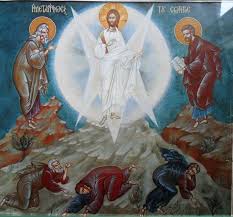The Collect of the Day
O
Lord, you have taught us that without love whatever we do is worth nothing: Send your Holy Spirit and pour into our hearts
your greatest gift, which is love, the true bond of peace and of all virtue,
without which whoever lives is accounted dead before you. Grant this for the
sake of your only Son Jesus Christ, who lives and reigns with you and the Holy
Spirit, one God, now and for ever. Amen.
1st Reading: Genesis
45:3-11, 15
Joseph, the next to the youngest
of the twelve sons of the patriarch Jacob, was sold into slavery by his older
brothers, who grew tired of his dreams of predominance over them, and the
special treatment he received from their father. Joseph ends up in Egypt, and, despite many
trials, he becomes chief steward of the land. When famine comes to the region,
Jacob sends his sons to Egypt to buy grain, where they must deal with Joseph,
who eventually reveals his identity in today’s passage. Joseph does not seek revenge
but takes the long view (see today’s psalm), that God has meant all that has
happened for good, or, we might say, has used what has happened for good.
45:3 Joseph said to his brothers, “I am
Joseph. Is my father still alive?” But his brothers could not answer him, so
dismayed were they at his presence. 4 Then Joseph said to his brothers, “Come
closer to me.” And they came closer. He said, “I am your brother, Joseph, whom
you sold into Egypt. 5 And now do
not be distressed, or angry with yourselves, because you sold me here; for God
sent me before you to preserve life. 6 For
the famine has been in the land these two years; and there are five more years
in which there will be neither plowing nor harvest. 7 God sent me before you to preserve for you a
remnant on earth, and to keep alive for you many survivors. 8 So it was not you who sent me here, but God;
he has made me a father to Pharaoh, and lord of all his house and ruler over
all the land of Egypt. 9 Hurry and
go up to my father and say to him, ‘Thus says your son Joseph, God has made me
lord of all Egypt; come down to me, do not delay. 10
You shall settle in the land of Goshen, and you shall be near me,
you and your children and your children’s children, as well as your flocks,
your herds, and all that you have. 11 I
will provide for you there—since there are five more years of famine to come—so
that you and your household, and all that you have, will not come to poverty.’”
15 And he kissed all his
brothers and wept upon them; and after that his brothers talked with him.
Psalm 37:1-12, 41-42
Psalm 37, one of the longest of the psalms, is a wisdom psalm,
directed, perhaps, at those troubled by the continued presence of injustice in
the world. Do not be discouraged, the
psalmist says, the appearance of wealth and power in this world is an illusion. Trust in God, the psalmist says, acknowledging
that this will require patience (v. 7).
1 Do not fret yourself because of evildoers; *
do not be jealous of those who do wrong.
2 For they shall soon wither like the grass, *
and like the green grass fade away.
3 Put your trust in the Lord and do good; *
dwell in the land and feed on its riches.
4 Take delight in the Lord, *
and he shall give you your hearts’ desire.
5 Commit your way to the Lord and put your trust in him, *
and he will bring it to pass.
6 He will make your righteousness as clear as the light *
and your just dealing as the noonday.
7 Be still before the Lord *
and wait patiently for him.
8 Do not fret yourself over the one who prospers, *
the one who succeeds in evil schemes.
9 Refrain from anger, leave rage alone; *
do not fret yourself; it leads only to evil.
10 For evildoers shall be cut off, *
but those who wait upon the Lord shall possess the land.
11 In a little while the wicked shall be no more; *
you shall search out their place, but they will not be there.
12 But the lowly shall possess the land; *
they will delight in abundance of peace.
41 But the deliverance of the righteous comes from the Lord *
he is their stronghold in time of trouble.
42 The Lord will help them and rescue them; *
he will rescue them from the wicked and deliver them,
because they seek refuge in him.
As Paul continues his arguments regarding the resurrection, he
tackles the difficult subject of, as we say in the creeds, “the resurrection of
the body.” Greek culture could grasp the
immortality of the soul, but the resurrection of the body was beyond the
average Greek’s belief. Paul’s argument
is that there are many kinds of bodies, including spiritual bodies. Earthly human flesh will be transformed.
15:35 Someone
will ask, “How are the dead raised? With what kind of body do they come?” 36 Fool! What you sow does not come to life
unless it dies. 37 And as for what
you sow, you do not sow the body that is to be, but a bare seed, perhaps of
wheat or of some other grain. 38 But
God gives it a body as he has chosen, and to each kind of seed its own body. 42 So it is with the resurrection of the dead. What is sown is
perishable, what is raised is imperishable. 43 It
is sown in dishonor, it is raised in glory. It is sown in weakness, it is
raised in power. 44 It is sown a
physical body, it is raised a spiritual body. If there is a physical body,
there is also a spiritual body. 45 Thus
it is written, “The first man, Adam, became a living being;” the last Adam
became a life-giving spirit. 46 But
it is not the spiritual that is first, but the physical, and then the
spiritual. 47 The first man was
from the earth, a man of dust; the second man is from heaven. 48 As was the man of dust, so are those who
are of the dust; and as is the man of heaven, so are those who are of heaven. 49 Just as we have borne the image of the man
of dust, we will also bear the image of the man of heaven. 50 What I am saying, brothers and sisters, is
this: flesh and blood cannot inherit the kingdom of God, nor does the
perishable inherit the imperishable.
Gospel
Reading: Luke 6:27-38
The middle portion of Luke’s “Sermon on the Plain” speaks
primarily of love and its requirements in deed, such as the love of enemy, the
treatment of those among us who are poor, and the love of the stranger. When one practices this kind of love,
judgment falls to the floor and forgiveness is raised as the highest of values. Luke changes Matthew’s “Be perfect” to “Be
merciful” (v. 36). Perhaps they were simply using different collections of
these sayings of Jesus, but it could also be that Luke understands the
perfection of God to be shown most clearly in the mercy of God.
6:27 Jesus
said, “But I say to you that listen, Love your enemies, do good to those who
hate you, 28
bless those who curse you, pray
for those who abuse you. 29 If
anyone strikes you on the cheek, offer the other also; and from anyone who
takes away your coat do not withhold even your shirt. 30 Give to everyone who begs from you; and if anyone takes away your
goods, do not ask for them again. 31 Do
to others as you would have them do to you. 32 If
you love those who love you, what credit is that to you? For even sinners love
those who love them. 33
If you do good to those who do
good to you, what credit is that to you? For even sinners do the same. 34 If you lend to those from whom you hope to receive, what credit is
that to you? Even sinners lend to sinners, to receive as much again. 35 But love your enemies, do good, and lend, expecting nothing in
return. Your reward will be great, and you will be children of the Most High;
for he is kind to the ungrateful and the wicked. 36 Be
merciful, just as your Father is merciful. 37 Do
not judge, and you will not be judged; do not condemn, and you will not be
condemned. Forgive, and you will be forgiven; 38 give,
and it will be given to you. A good measure, pressed down, shaken together,
running over, will be put into your lap; for the measure you give will be the
measure you get back.”
The
Scripture quotations (except for the Psalm) are from the New Revised Standard Version Bible, copyright © 1989 by the
Division of Christian Education of the National Council of Churches of Christ
in the U.S.A. All rights reserved. The Collect of the Day and the Psalm translation
are from The Book of Common Prayer. Commentaries are copyright © 2022
Epiphany ESources, 67 E. Main St., Hornell, NY 14843. www.EpiphanyEsources.com. All rights
reserved. Permission is given to copy for group study.
To receive these readings and commentaries in your e-mail inbox on
the Monday prior to their use, go to www.epiphanyesources.com
and click on “Subscribe.”





